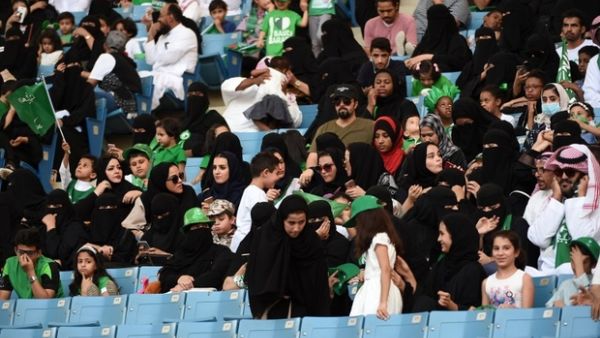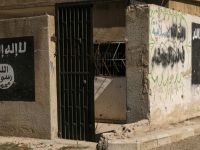- Saudi women were allowed to celebrate the kingdom's national day at a sports stadium, previously a male-only venue, on Sunday.
- The kingdom is displaying some leniency as part of its "Vision 2030" plan for economic and social reforms.
- Saudi Arabia is currently battling for regional influence against Iran, as well as controversially intervening in Yemen. Additionally, it remains in conflict with Qatar.
- In a coordinated crackdown, two dozen people have been arrested, allegedly for opposing Prince Mohammed's aggressive foreign policy.
Hundreds of Saudi women filled a sports stadium for the first time to mark the conservative kingdom's national day on Saturday.
Women were allowed to enter the stadium, a previously male-only venue used mostly for football matches, with their families and seated separately from single men to watch a musical show and a play on Saudi history.
"We hope in the future that there will be no restrictions on our entrance to the stadium," Um Abdulrahman, a woman from the northwestern city of Tabuk, told AFP.
"For many years ago I have hoped that women will be given the same rights as men."
"Looks like women bought all the tickets!" one Saudi man quipped on Twitter.
Ultra-conservative Saudi Arabia has some of the world's tightest restrictions on women and is the only country where they are not allowed to drive, despite ambitious government reforms aimed at boosting female employment.
- Saudi Embassy Urges Respect of Austria's Niqab Ban
- These European Countries want to Impose Saudi-Style Controls on Women's Dress
Under the country's guardianship system, a male family member - normally the father, husband or brother - must get permission for a woman's study, travel, and other activities.
But the kingdom appears to be relaxing some norms as part of its "Vision 2030" plan for economic and social reforms conceived by powerful Crown Prince Mohammed bin Salman.
The national day celebration coincides with a crucial time for Saudi Arabia, which is in a battle for regional influence with arch-rival Iran, bogged down in a controversial military intervention in neighboring Yemen and at loggerheads with fellow US Gulf ally Qatar.
The 32-year-old prince is set to be the first millennial to occupy the throne in a country where half the population is under 25, although the timing of his ascension remains unknown.
Already viewed as the de facto ruler controlling all the major levers of government, from defense to the economy, the prince is seen as stamping out traces of internal dissent before any formal transfer of power from his 81-year-old father King Salman.
This month, authorities arrested around two dozen people, including influential clerics, in what activists decried as a coordinated crackdown.
Analysts say many of those detained are resistant to Prince Mohammed's aggressive foreign policy that includes the boycott of Qatar as well as some of his bold reforms, dubbed Vision 2030, which include privatizing state assets and cutting subsidies.
Saudi Arabia has cautiously begun introducing entertainment, including music concerts, despite opposition from hardliners in the kingdom, where public cinemas and theatre are banned.
This article has been adapted from its original source.








